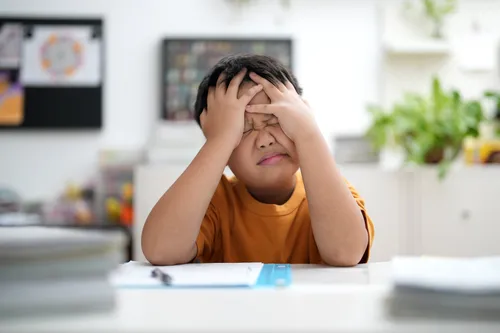Esther Lim, Speech-Language Pathologist at Oasis Place, delves into learning disabilities and the question many parents face: Would my child benefit more from a tutor or a speech-language pathologist?
Parents of children with learning disabilities may often find themselves asking teachers and other professionals, ‘What else can I do to support my child? Do they need a tutor?’ Before we explore that question further, let us first look at what encompasses a learning disability.

Learning Disabilities
The term ‘learning disability’ is an umbrella term that refers to a neurobiological disorder that affects the cognitive processes related to learning and is due to variations in brain structure and function. Simply put, the term ‘learning disability’ is used to describe a group of disorders that affect how a person learns.
Unlike other disabilities, learning disabilities are often less obvious and more difficult to identify. It is important to note that a learning disability is not the same as an intellectual disability. Many people with learning disabilities still have average to above intelligence. They may not show signs of learning difficulties except in a particular area of cognitive processing.
People with learning disabilities experience difficulty as a result of impairments in one or more processes related to perception, thought, memory and learning. Examples are:
- oral language (listening, speaking, understanding)
- reading (decoding, phonetic knowledge, word recognition, comprehension)
- written language (spelling and written expression)
- mathematics (computation, problem-solving)
- social skills (social perception, social interaction, perspective-taking)
- organisational abilities
Children with learning disabilities have specific difficulties with language skills and this falls within the scope and expertise of a speech-language pathologist (SLP).
Roles and Responsibilities of the Speech-Language Pathologist (SLP)
SLPs are experts at screening individuals for possible speech, language and communication disorders. SLPs have the knowledge and skills to treat these disorders. The following are some of the responsibilities of an SLP:
- Prevention – SLPs are integrally involved in the efforts to prevent academic failure. SLPs use evidence-based practice (EBP) in prevention approaches.
- Assessment – SLPs will assess the child’s language, phonological awareness, reading, spelling and writing skills. The SLP can also test the child’s cognitive skills, which include planning, organising, and paying attention to details.
- Intervention – SLPs provide intervention that is appropriate to the age and learning needs of each individual and is selected through an evidence-based decision-making process. A clinical understanding of the child’s strengths and weaknesses in each area allows the SLP to plan for the child’s individual treatment program.
- Data Collection and Analysis – SLPs gather and interpret data from intervention sessions, which is then used to make decisions for future intervention sessions. The data is also compared to short-term and long-term goals set in collaboration with the family of the child and based on the findings of the assessment.
- Collaboration with other Professionals – The saying ‘it takes a village to raise a child’ rings true when working with a child with a learning disability. The unique contributions of the SLP complement the perspectives and skills of other professionals, such as teachers, special education teachers, reading specialists, literacy coaches, school psychologists and more.
SLP Intervention for Learning Disabilities
Intervention is dependent upon the individual needs of the child. In targeting academic goals, the SLP will work on what your child learns in school. Some examples of what the SLP may work on with the child include:
- Observing, reading and talking about books.
- Matching sounds to letters and identifying individual sounds in words.
- Answering questions after listening to a story. The child may be asked to re-tell the story or write a summary.
- Using augmentative and alternative communication (AAC) – a communication method used to supplement or replace speech or writing for those with impairments in the production or comprehension of spoken or written language.
The SLP will continue to support the child in a school environment by working with the child’s teacher or special education teacher. This includes collaborating on the child’s individualised education plan (IEP) to ensure that the child receives the best support possible for greater academic success. The SLP can also equip the child with strategies to organise and focus on specific activities and tasks.
Tutors vs SLPs
In response to the question, ‘Could a tutor help my child with a learning disability?’ the answer is both yes and no. Typically, tutors help the student ‘catch up’ academically, rather than to remediate the underlying, foundational skills required for learning. This is where the SLP’s skills and expertise are required to identify and address the areas of weakness.
The role of a tutor can be summarised as follows:
- To speed up the learning process.
- To make up for the skills the child has lost.
- To get the child back to the instructional level in class.
Tutors will be able to offer their expertise in a particular subject to help the child in his learning. However, tutors typically rely on others, such as SLPs, to administer diagnostic assessments.
The reality is, the key to success is early identification and intervention for children with learning disabilities – with the understanding that success does not mean that the disability will disappear. Rather, intervention allows the child with learning disabilities to be equipped to use their strengths and compensatory strategies effectively to achieve both academic and personal goals.
For more information, visit www.oasisplace.com.my















![[Maahad Tahfiz Negeri Pahang] Asia Youth International Model United Nations](https://mint-edm.sgp1.digitaloceanspaces.com/production/qKffTsfZisDxO4b6kcejusAA7mWWgL.jpg)





















